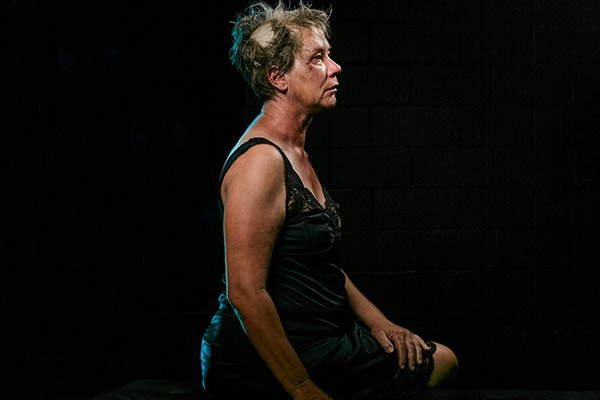‘The Human Voice' from French poet Jean Cocteau, playing at Melbourne's Theatre Works, is set in a patriarchal purgatory.
'The Human Voice' is a solo monologue, originally written by Jean as a challenge for a female actor, as he felt it was 'un-actable'. Directed here by Briony Dunn, it's a compelling translation by Iris Gaillard following a woman awaking from limbo to answer the phone. She must look after the man she loves. . . Even if it grinds her into the fetid rot of systemic power that wreaks havoc on her body.
What will it take to break the cycle? Will it kill her or free her?
Here, powerhouse actor Jane Montgomery Griffiths, starring in the show, pens a thoughtful, topical open letter ahead of the season at Theatre Works.
'MOTHER OF THREE - 10, 11 & 15 - DIVORCEE. AMERICAN. THIRTY YEARS EXPERIENCE AS AN ACTRESS IN MOTION PICTURES. MOBILE STILL AND MORE AFFABLE THAN RUMOR WOULD HAVE IT. WANTS STEADY EMPLOYMENT IN HOLLYWOOD. (HAS HAD BROADWAY) ...REFERENCES UPON REQUEST.'
I didn't think much of that story when I first heard it, years ago now. A quaint anecdote from a time when sexism and ageism were rife and the Hollywood studio system chewed up and spat out its stars with no compunction. Yep, it didn't mean a lot to me when I was in my 20s - or 30s. . . Or even 40s. But I don't find it such a quaint story now. I find it just a bit heartbreaking. Sure, it was ironic; sure, it demonstrated Davis' acerbic wit. But it also said a lot about her career despair and sense of the self-identity she felt she needed to project: mother, first; relationship to 'her man', second; affable, third; physically good for her age; self-deprecating of talent and experience; open to being referee-checked. Hmmm.
Not that much has changed, it seems, in 60 years, when it comes to how 'women of a certain age' feel they should present themselves. Gradually, as we age, our identity becomes defined through others – we are mothers, wives, partners – and those who are child free or single must be very, very careful to demonstrate that they are 'more affable than rumour would have it' or heaven forfend the accusations that will be levelled at us. Our sense of self slowly erodes, along with the tightness of our skin, the smoothness of our complexion, and the density of our bone mass. Children grow up, mid-life crises hit, marriages break down, perimenopause hits, and menopause turns us into sweating, freezing, aching, temperamental, emotional, metabolically challenged, elastic-waist-dependent, hormonal wrecks – while all the time we have to behave in a sufficiently 'pleasant' way so that, if ever our figurative references were checked, we might just get that metaphorical 'steady employment'.
Jane Montgomery Griffiths
I've been thinking about this a lot the last few weeks as I've been in rehearsals with the wonderful director Briony Dunn for 'The Human Voice'. In it, a middle-aged woman is trapped in her final phone conversation with her former lover who has just left her to marry another, younger model. For its duration we see this woman placate, praise, reassure, excuse and tend to the lover who has abandoned her, all the while hiding the devastating pain and grief she is suffering at the betrayal. Remarkable, really, that a gay bloke in the 1920s could write with such profound understanding of the middle-aged female psyche. Remarkable too that, for me, as a 50-something actress, such a gift of a part should be waiting. Because just as certain bits of our bodies tend to go southwards with age, so too do our careers. When we were young, there seemed to be loads of juicy parts: the classical canon had all of those heroines and TV was full of the stories of 20- and 30-somethings trying to work out life's problems. As we've aged, though, the parts dry up. Life has given us experience; we know who we are; we are actually quite interesting by the time we hit our 50s. But our stories just aren't out there. Or at least, not that much. We have become invisible – as invisible as we feel we are when we look in the mirror, expecting to see the younger self we feel ourselves to be and, as Cocteau writes in the play ‘stumble across an old hag with grey hair and masses of wrinkles'.
Post-COVID, the performing arts industry has had to take stock of itself in a number of ways. Following hot on the soul-searching heels of #metoo, the industry has had to reflect on employment conditions and employment opportunities. Massive strides are being taken to counter the sexism that has plagued the industry from its very beginnings, but there is a long way to go – and part of that is to recognise the sexism that erases the older woman's experience, her natural body and her sense of self. In practical terms, older women need jobs just as much as younger people; in representational terms, older stories – and older bodies, complete with sagging skin and cellulite – should be out there. When 'The Human Voice' was written in 1928, it was avant-garde. It's a sad indictment of the sexism and ageism in our culture that, 96 years on, its focus on the older woman's experience is still pretty revolutionary.”
'The Human Voice' plays Theatre Works (Melbourne) 4-14 May.


